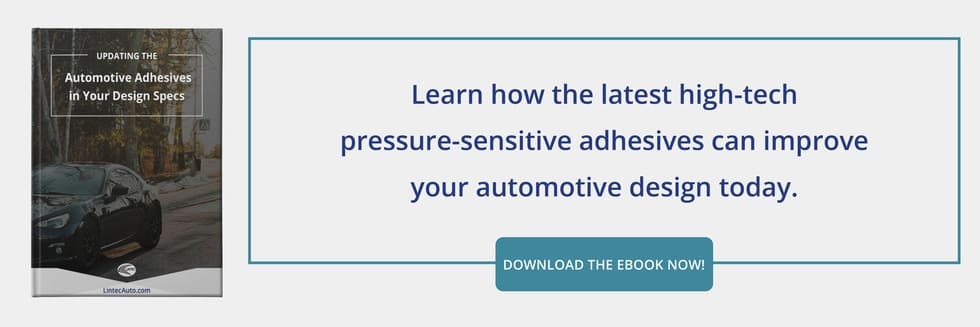We’ve entered a new phase of automotive lightweighting. Five years ago, aluminum was seen as the go-to solution. Today, the consensus—according to SME—has moved towards synthetic and mixed materials. Carbon fiber, composites, thermoplastics, aluminum, and other lightweight materials have all had a heavy impact on lightweighting efforts, as McKinsey reports.
But mixed material bodies do bring their own share of complications, such as:
- Mixed thermal expansion ratios in dissimilar substrates
- Steel-on-aluminum galvanic corrosion
- Rattling and buzzing due to lightweight components
- Increased risk of failure at fastener stress points
These threats are unique to modern vehicles, but they come with a modern solution—automotive industrial tapes. There are many reasons that metal fasteners are rapidly disappearing from the assembly in favor of structural-strength PSAs, and all of them are long-overdue improvements for an industry in flux.
LINTEC Automotive Has Industrial Tapes for Every Pain Point
Our automotive tapes are superior to traditional mechanical fasteners in nearly all respects. The raw versatility of polymers and synthetic adhesives allows manufacturers like LINTEC Automotive to custom-tailor each PSA to the rigors of the project. Here are some of the common pain points of mechanical fasteners that we solve with an automotive tape solution:
- Stress Distribution: A strip of pressure-sensitive adhesive tape runs along the full contact area between parts. This provides a more rigid, stable, and balanced bond than mechanical fasteners, which focus all of the stress of the bond around discrete fastening points. In other words, our tapes can increase your total bond strength.
- Lightweighting: Stronger bonds that better diffuse stresses have another advantage—you can use lighter and thinner components without risking failures around mechanical fasteners. This helps with lightweighting even more than the removal of the fasteners themselves.
- Noise, Vibration, and Harshness (NVH): The prevalence of lightweight materials and plastics in today’s vehicles reduces sound insulation and increases rattling from lightweight components. The rigid, full-surface bonds of our industrial tapes will keep things quiet and never need re-tightening as mechanical fasteners do. Automotive foam anti-vibration tapes can further dampen and diffuse energy from vibrations.
- Cycle Times: PSAs go on quickly and bond instantly with minimal equipment. No individual torquing of every fastener, no drilling or tapping of every hole, and a much simpler check in QA.
- Total Cost: Because they don’t require complex, specialized tools to apply, industrial tapes save a fortune on purchasing and maintaining expensive equipment. They also take far less training than welds, torquing tools, and other fastening methods. They’re just tape.
- Durability: LINTEC Auto industrial tapes can use adhesives that will outlast the average service life of the vehicle. Tape is no longer synonymous with DIY fixes—these automotive PSAs are industrial grade, permanent solutions.
- Aesthetics: Mechanical fasteners require tapped holes and leave the heads of bolts and screws exposed. Our tapes enable you to leave a smooth, flawless surface on the visible areas of bonded parts.
- Dissimilar Substrates: Any double-sided PSA creates a barrier between steel and aluminum, preventing galvanic corrosion. Our polyethylene foam tapes are also viscoelastic, meaning they can flex and stretch to accommodate different thermal expansion rates without weakening the bond.
Automotive engineers are seeking solutions to these problems every day. Look no further than the robust, expansive portfolio of industrial tapes at LINTEC Automotive. Our tapes will outperform mechanical fasteners in nearly every use case. Get in touch today to discover what we can do for your next design project.


